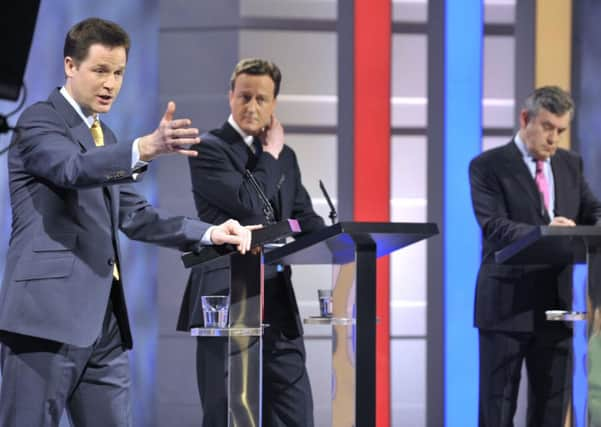Cameron ‘running scared’ from TV debates


The Prime Minister, who has little to gain from the televised debates, has told the main broadcasters he will do one TV debate with at least seven other party leaders,and only then if it happens before campaigning starts in April.
Mr Miliband said that the Prime Minister was “cowering from the public”, and promised to debate the PM “anytime, anyplace, anywhere” as he demanded further debates.
Advertisement
Hide AdAdvertisement
Hide AdDowning Street rejected broadcasters’ proposals for three TV debates during the election campaign and made a “final offer” of a single 90-minute show. Advisers are thought to have told Mr Cameron the damage of not appearing on the debates would be less than the damage caused by losing a debate to Mr Miliband.
Liberal Democrat leader Nick Clegg said that he was willing to take the PM’s place in the one-on-one debate with Mr Miliband, if Mr Cameron refused to turn up for the clash, scheduled to be shown on Sky News and Channel 4 on April 30 - exactly a week before the May 7 election.
Labour dismissed the suggestion as “ridiculous”, suggesting that the Deputy Prime Minister should instead debate with their deputy leader Harriet Harman.
Ukip’s Nigel Farage said Mr Cameron was trying to “sabotage” the debates, while Mr Clegg accused the PM of “lofty pomposity” in trying to dictate their format.
Advertisement
Hide AdAdvertisement
Hide AdIn a process of negotiations stretching over months, Mr Cameron has previously raised objections to broadcasters’ proposals, first on the grounds that they excluded the Greens, and then that the Democratic Unionist Party had been left out. Labour have accused the Tories of working behind the scenes to scupper the live broadcasts - first tried in a UK General Election in 2010.
Speaking during a visit to Staffordshire, the Prime Minister insisted he had been “completely consistent” on the debates, saying: “I haven’t put hurdles in the way, the broadcasters came up with a series of proposals that other people realised were flawed.
“I am unblocking the log jam and saying let’s have this seven-cornered debate and get on with it before the campaign. Then we can actually do what needs to be done, which is to get round the country during the election campaign.
“Everyone knows what the Conservative proposals are and the Labour proposals are, and the other parties can speak for themselves.”
Advertisement
Hide AdAdvertisement
Hide AdMr Miliband said he was ready to debate the Prime Minister “any time, any place, anywhere”.
“It is now clear that David Cameron is ducking the debate with me. He is cowering from the public,” said Mr Miliband.
“The British people deserve this debate. I’ll debate him any time, any place, anywhere. He should stop ducking and weaving and name the date.”
The Labour leader’s comment echoed Mr Cameron’s own 2007 challenge to Gordon Brown to face him in a TV debate, when he said: “Any time, anywhere. I will even pay for the taxi to take him (Gordon Brown) to the studio. In fact, I’ll even drive the cab.”
Advertisement
Hide AdAdvertisement
Hide AdMr Cameron’s terms were set out in a letter from his director of communications, Craig Oliver, to Sue Inglish, chairwoman of the broadcasters’ leaders’ debates committee. The BBC, ITV, Channel 4 and Sky said they would respond to the Conservatives’ proposal in due course.
Electoral Reform Society chief executive Katie Ghose said: “No TV debates in 2015 would be a backward step in terms of our democratic development.”